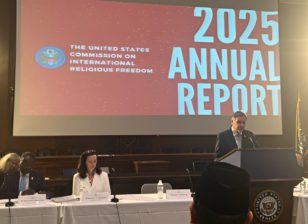Reaper drone deal bad optics when India is trying to kill US citizens: Human Rights Watch
Washington, D.C. (Feb 14, 2024) – At a Congressional Briefing on Capitol Hill titled “US Arms Sales to India: The role of the US Congress,” Human Rights Watch Asia Advocacy Director John Sifton strongly criticized the “bad optics” of the Biden administration’s intent to sell the Indian government 31 armed MQ-9 reaper drones with accompanying munitions, which are often used to assassinate civilians in targeted strikes – just months after the US uncovered a plot by the Indian government to to assassinate a Sikh American living in New York.
“The particularly bad optics of selling this particular weapons platform… [is that it] is best known for targeted killings, which some would call assassinations,” said Sifton. “That the US negotiated and prepared a proposal at the same period law enforcement and intelligence agencies were briefing them on an assassination by an agent of the Indian government on US soil suggests a disconnect that we find very concerning on the optics.”
“These things have impacts on people’s behavior back in India, including the Prime Minister himself,” Sifton added. “Whether the Biden administration likes it or not, the message sent is we don’t really care that much about the fact that India’s human rights situation is deteriorating.”
Also speaking at the briefing was Carolyn Nash, Asia Advocacy Director at Amnesty International USA, who pointed out that the proposed arms deal must also be considered in light of the Modi government’s engagement in transnational repression, including its recent attempt to assassinate a Sikh American living in New York.
“That case did not happen in a vacuum,” said Nash. “It emerged from domestic issues; from the misuse of laws, particularly purported counterterrorism and financial laws; from long histories of ethnic and religious violence and targeting; and from abuse of surveillance systems that allowed for this to happen.”
“Think about [violence in India] as if you’re talking about the Jim Crow south,” said Ria Chakrabarty, Policy Director at Hindus for Human Rights. “The communal violence, the misuse of state and local authorities… There’s [an] active participation of local and state actors that also goes up to the federal level.”
“All of this violence, all of these attacks on human rights are about fundamentally reforming India from a secular republic to a Hindu nation,” Chakrabarty added. “The BJP’s election message is that Modi… has delivered this Hindu state to the world stage. And this arms deal is a good encapsulation of how he has done that.”
“President Clinton [once] referred to the India Pakistan border as the most dangerous place on earth, because that is the only place where there are three nuclear armed states who have previously fought one another are now bordering one another,” said Ari Tolany, Director at the Security Assistance Monitor for International Policy. “With that concern introduced, we see a stronger imperative needed for Congress to keep eyes on [arms sales to India].”
The briefing was co-organized by Indian American Muslim Council, Hindus for Human Rights, Dalit Solidarity Forum, New York State Council of Churches, World Without Genocide, Justice for All, Federation of Indian American Christian Organizations of North America, India Civil Watch International, Center for Pluralism, International Commission for Dalit Rights, American Muslim Institution, International Society for Peace and Justice. North American Manipur Tribal Association, Association of Indian Muslims of America, Periyar Ambedkar Thoughts Circle Australia, and Alliance Against Islamophobia.




